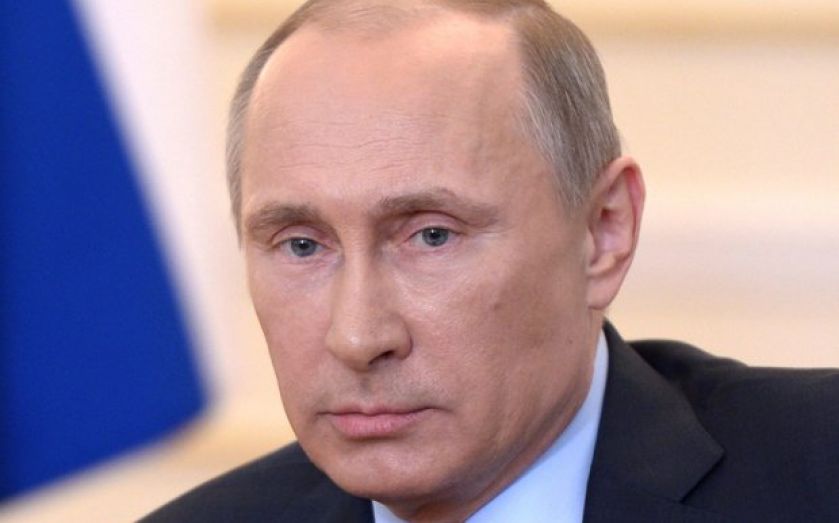Putin has exposed a chilling truth about the West: It no longer exists

Somehow Europe’s leaders have managed to undershoot even my subterranean expectations. Ahead of an EU foreign ministers meeting yesterday to plan a common response to the Malaysia Airlines atrocity, leaks made it all too clear that this whole process would not amount to much. But the results – even for the EU – are almost comically meagre, if the issue were not so important.
It looks like a slightly larger list of Vladimir Putin’s cronies will be given travel bans and have their overseas accounts frozen, and that this will be finalised on Thursday. Nowhere is there a peep that Tier 3 sanctions – those that would affect an entire sector of the Russian economy, and the only sort likely to get Putin’s attention – are remotely on the cards. In fact, ahead of the meeting, senior French officials made it crystal clear that at present Europe is only considering far lesser strictures.
It also seems that David Cameron’s fine suggestion that there should be a complete EU-wide embargo on future defence contracts with Moscow has gone by the board. Instead, just ahead of the meeting, French President Hollande (in his usual otherworldy manner) made it clear that Paris was going ahead with selling the Kremlin at least one Mistral helicopter-carrying assault ship, as the entirety of the arms deal is worth €1.2bn to France. So much for solidarity.
Lastly, there is the obvious and embarrassing fact that, even given this very thin gruel, the foreign ministers were unable to rapidly reach a common position, postponing the final outcome until Thursday. So to sum up: no Tier 3 sanctions, no arms embargo, and let’s meet again soon to hammer out the utterly unimportant details.
Even beyond the atrocity of MH17, from the Western perspective, the overview of the Ukrainian narrative is not in dispute: Putin continues to behave badly, not keeping his promises of non-interference to Western leaders, and instead is to some extent orchestrating the separatist revolt. American and other Western intelligence agencies concur that the Kremlin has not cut off the flow of fighters and arms to the pro-Russian militants. But if the disease, Putinism, is easy enough to diagnose, the course of treatment for such an illness remains severely in dispute. Europe as a whole is fully committed to living with the malady of Russian adventurism, however harmful it becomes, while the White House still hopes for a treatment regimen that over time might eradicate the problem entirely.
The latest US sanctions imposed last week by Barack Obama, and which the White House surely wishes Europe would follow, do not yet amount to the equivalent of waging economic war on Russia, but they are certainly a step in the direction of tightening the screws. While America’s new restrictions do not fully cut off entire sectors of Russia’s oil-dependent economy, US sanctions do go after some of the giants of the Russian finance, energy, and defence worlds. For example, they restrict access to American capital markets for major Russian companies, including Rosneft and Gazprombank.
Of course, even these harsher measures have decided limits, and are on their own unlikely to make Putin change his strategic direction. The affected companies can easily get US dollar financing elsewhere. However, what America’s new sanctions do allow for is that – if Putin continues to meddle – Washington has set the groundwork for full-out sectoral sanctions, which could prove to be a dagger in the heart of the Russian vampire.
And what has been the EU’s response to this example of America’s increasing toughness regarding the Kremlin? To embarrassedly wish President Obama just got with the programme, and went through the motions of “doing something” (a favourite European trope) rather than actually taking serious counter-moves to change Russia’s behaviour. For in reality, Angela Merkel simply does not want to tip over the apple cart of German-Russian trade.
Yet this widening gulf between the US and Europe exposes another more chilling truth. The West itself is no longer a coherent actor on the world stage, capable of reaching a common position, and then implementing polices designed to further that stance. Beyond agreeing that Putin is not playing by the rules, there is almost no consensus across the Atlantic on what – if anything – should be done about it. This sorry tale means the world’s pre-eminent fireman is no longer able to quell the blaze.
Dr John C Hulsman is senior columnist at City A.M. He is a life member of the Council on Foreign Relations, and author of Ethical Realism, The Godfather Doctrine, and most recently Lawrence of Arabia, To Begin the World Over Again. He is president and co-founder of John C Hulsman Enterprises (www.john-hulsman.com), a global political risk consultancy, and available for corporate speaking and private briefings at www.chartwellpartners.co.uk